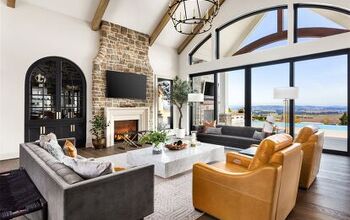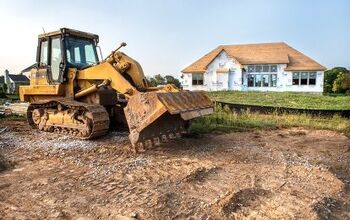How Big Of A Garage Can I Build On My Property? (Find Out Now!)

A garage can be a great addition to your home and property for many reasons. To begin with, it can boost the value of your property and home. It also provides protection for your vehicles. That alone pays dividends, such as promoting longer vehicle life or eliminating the need to shovel snow off the car. Garages also create more space and room. Many homeowners who want to build a garage also ask how big of a garage can I build on my property?
A garage on your property can be no higher than about 13 feet and must be of reasonable size, according to most jurisdictions. Anything exceeding these specifications will require obtaining special permissions. Detached garages and buildings must be built in either the rear or side yards and are not to exceed 1000 square feet. Additionally, both attached and detached garages and buildings are not to occupy more than half the land around the property.
The standard sizes for garages are typically 14 feet by 20 feet for a typical single-car garage. Those dimensions are 24 feet by 20 feet for the traditional two-car garage. For buildings or garages that exceed these limitations, a special building permit will be required. The local city government office will be able to help direct people in the right direction for obtaining a permit for said jurisdictions.
Typically speaking, when homeowners build or add a garage they also will want to add a driveway. That, of course, begs the next obvious question.
Do You Need a Permit Service?
Get free, zero-commitment quotes from pro contractors near you.

What are the Regulations for Driveways?
The basic rule of thumb for driveways is that the pavement typically is the same or within proximity of the same width as the garage. As mentioned earlier, this would be 10 feet for a single-car garage. Most city and governing municipalities also require that garage driveways have flares. The standard for flares is about 3 feet, with one on each side of the driveway.
Much like garages and detached buildings, it is important that every homeowner check the specific regulations and ordinances for their city, town, or village of residence. Homeowners are also required to deal with the expense and headache of fixing the problem. They can also potentially incur fines for violating building and driveway ordinances.
Types of Garages
When it comes to adding a garage to their property, homeowners also have a wide range of options. These different types of buildings and garages vary and offer many different features. Each structure, however, must stay within the approved building standards. Those that don’t, will need to obtain special building permits.
Detached Garages
There are many reasons that can make a detached garage the perfect option, or the only option. The good news is, attached garages can be added before, during, or after a home is built. In some situations, as the result of natural impediments or property lines, there is no access point for an attached garage door. Homeowners can also make the cost of building a home and garage more manageable by adding a detached garage later on.
Many detached garages are prefab styles. There are also plenty of available contractors capable of delivering custom-built garages. There is also no limit to the colors, looks, or designs for detached garages too.
Attached Garages
Arguably, attached garages are the most popular option, and for a few reasons. The attached garages are typically built at the same time as the home. Along with being a home for the vehicle, attached garages are famously known for being ideal storage areas. That is in large part due to the fact that attached garages typically offer a better climate and more protection. These are the benefits of the garage being attached to the home itself.
These typical fair-weather climates for attached garages have also made them popular dual-purpose buildings. In many cases, they are used as a workshop for homeowners. Another major benefit of having an attached garage is the ability to enter the home without going outside. This is an advantage during colder months and provides more safety for homeowners and their families.
Workshop Garage
This type of garage, which is typically attached, is the next step in the evolution of garages doubling as workshops. A workshop garage is built with not only the idea of protecting our vehicles but also for use as a workshop. These garages will also have noticeable modifications. That can include features such as pegboards and built-in racks and shelves, among others.
Carports
One of the most simple garage solutions is the carport. These simple overhang-like structures are the most cost-effective way to protect your vehicle. Carports, however, also offer the least amount of protection too. Carports, attached to the home, are like detached garages and can be built when the home is constructed or added later.
Do You Need a Permit Service?
Get free, zero-commitment quotes from pro contractors near you.

How Much Does It Cost to Build A Garage?
With the different types of garages and styles of garages available, the cost of having a garage built can vary considerably. On average, a traditional one-car garage can cost between $7,000 to $1500. For a two-car garage, those costs can range between $19,000 to $29,000. Those prices continue to climb, of course, for even larger garages.
Based on the standard rates, the cost to build a garage can be broken down to approximately $30 to $60 per square foot. For homeowners looking for either additional car protection or more affordable garage options, a carport will definitely save some expenses.
A basic carport will range between $3,000 to almost $10,000. Much of the expense of building a carport will be determined by the material used and the style of the carport. A standalone carport will typically cost more than the traditional carport that is attached and bolted to the home. Additionally, those who are thinking about a carport won’t have to worry about any building or ordinance regulations either. And carports also won’t require much time to put up either.
Related Guides

We are a team of passionate homeowners, home improvement pros, and DIY enthusiasts who enjoy sharing home improvement, housekeeping, decorating, and more with other homeowners! Whether you're looking for a step-by-step guide on fixing an appliance or the cost of installing a fence, we've here to help.
More by Upgraded Home Team



























